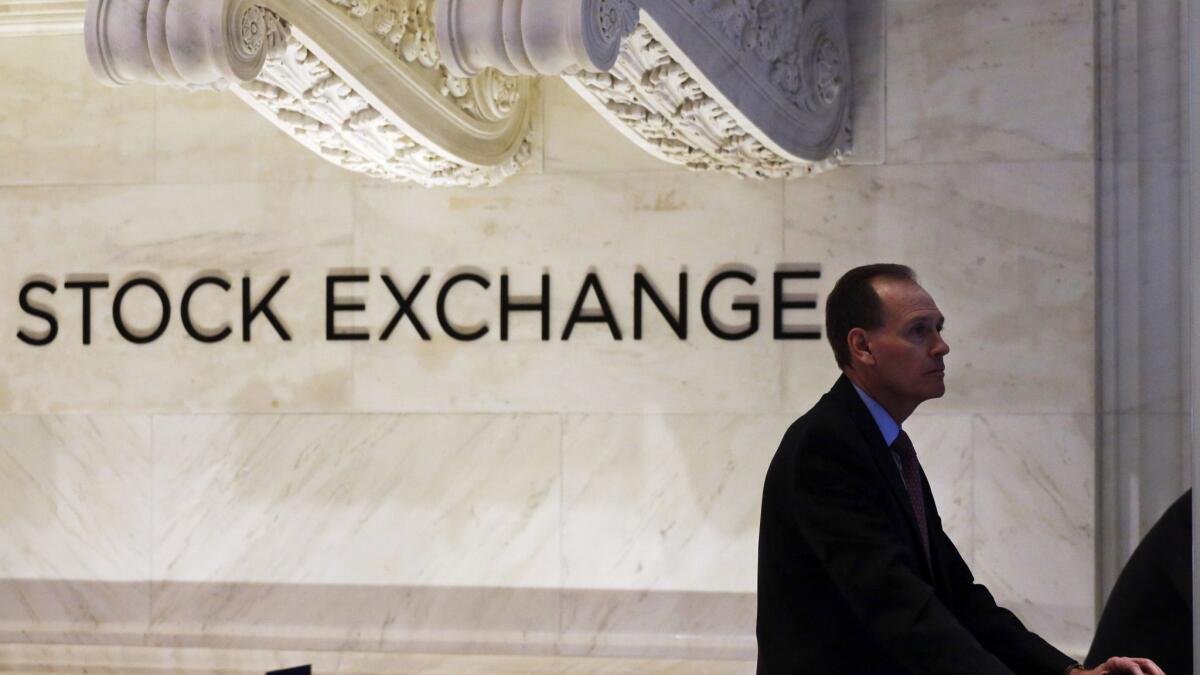Tech stocks jump; Amazon deal rattles healthcare firms

- Share via
Technology stocks rallied Thursday, helping U.S. indexes recover some of their recent losses, but trading remained uneven as investors tried to figure out if the tensions between the U.S. and other nations will escalate into a full-blown trade war.
Tech firms and banks were responsible for the bulk of the gains. Amazon surged after making announcements that shook investors in two industries: drug retailers and distributors, and delivery companies. U.S. crude oil rose to its highest price since November 2014.
Amazon jumps into drug business with PillPack acquisition, threatening to disrupt another industry »
Stocks started the day at their lowest levels in almost a month. Contradictory reports from U.S. officials about trade policy have led the market to lurch between gains and losses, sometimes by the hour.
“The market is watching the president and his team, and the president is watching the markets,” said Marina Severinovsky, an investment strategist at Schroders.
Severinovsky said the Trump administration doesn’t want to derail the economy or the stock market and is sensitive to the way investors react to the ongoing trade disputes. Lately they have sent stocks lower, but she said that if the market rallies in response to some strong second-quarter reports next month, the Trump team might feel encouraged to take tougher positions in trade talks.
The Standard & Poor’s 500 index rose 16.68 points, or 0.6%, to 2,716.31. The Dow Jones industrial average rose 98.46 points, or 0.4%, to 24,216.05. The Nasdaq composite rose 58.60 points, or 0.8%, to 7,503.68. The Russell 2000 index of smaller-company stocks ticked up 4.56 points, or 0.3%, to 1,645.02.
Amazon wants to help you start your own package-delivery service »
Amazon.com rose 2.5% to $1,701.45 after it said it’s buying online pharmacy PillPack, which offers presorted dose packaging and home delivery.
Investors expect Amazon to use its muscle to reduce costs and drug prices, and that led to sharp losses for drugstores, pharmacy benefits managers and companies that distribute medications. Walgreens dived 9.9% to $59.70. Medication distributor Cardinal Health slid 4.8% to $50.37. Pharmacy benefits manager Express Scripts fell 1.4% to $77.62.
Amazon also announced a new program under which contractors nationwide can launch businesses that deliver Amazon packages, meaning Amazon will have new ways to deliver products without relying on companies such as UPS and FedEx. UPS retreated 2.3% to $105.88. FedEx fell 1.3% to $226.67.
Benchmark U.S. crude continued to surge, rising 0.9% to $73.45 a barrel in New York. It’s at its highest price since November 2014. Brent crude, used to price international oils, rose 0.3% to $77.85 a barrel in London.
Oil prices have rallied over the last week. First, investors concluded that OPEC countries will not increase oil production by as much as they had feared. Then the U.S. started pressuring countries to stop importing oil from Iran, the world’s sixth-largest producer of oil. The Trump administration is threatening other countries, including close allies such as South Korea, with sanctions if they don’t cut off Iranian imports by early November, essentially erecting a global blockade.
BJ’s Wholesale Club jumped after the company went public again. The stock started trading at $17 a share, at the high end of the company’s projections, and then advanced 29.4% to $22. BJ’s was taken private in 2011.
Madison Square Garden Co. jumped 13.9% to $303.29 after it said it will consider spinning off its sports division, which owns the NBA’s New York Knicks and the NHL’s Rangers, into a separate publicly traded company.
Still, trade concerns are a major reason the market is having a downbeat finish to the second quarter. The S&P 500 is down 2.4% in the last two weeks, trimming its gain for the quarter to 3%. The Dow is up just 0.5%.
The volatility may worsen at the beginning of the third quarter, as the U.S. is set to impose a 25% tariff on billions of dollars’ worth of Chinese products starting July 6. In response, China will raise import duties on $34 billion worth of American goods.
Bond prices edged down. The yield on the 10-year Treasury note rose to 2.84% from 2.83%.
The dollar rose to 110.64 yen from 110.20 yen. The euro slipped to $1.1555 from $1.1557.
Gold fell 0.4% to $1,251 an ounce. Silver fell 1.2% to $16.04 an ounce. Copper fell 1.2% to $2.97 a pound.
Wholesale gasoline stayed at $2.13 a gallon. Heating oil stayed at $2.18 a gallon. Natural gas fell 1.4% to $2.94 per 1,000 cubic feet.
Germany’s DAX was down 1.4%. France’s CAC 40 shed 1%. Britain’s FTSE 100 lost 0.1%. Japan’s benchmark Nikkei 225 index remained flat, and South Korea’s Kospi lost 1.2%. Hong Kong’s Hang Seng rose 0.5%.
UPDATES:
2:55 p.m.: This article was updated with closing prices, context and analyst comment.
9:30 a.m.: This article was updated with morning stock market movement.
This article was originally published at 7:30 a.m.
More to Read
Inside the business of entertainment
The Wide Shot brings you news, analysis and insights on everything from streaming wars to production — and what it all means for the future.
You may occasionally receive promotional content from the Los Angeles Times.










